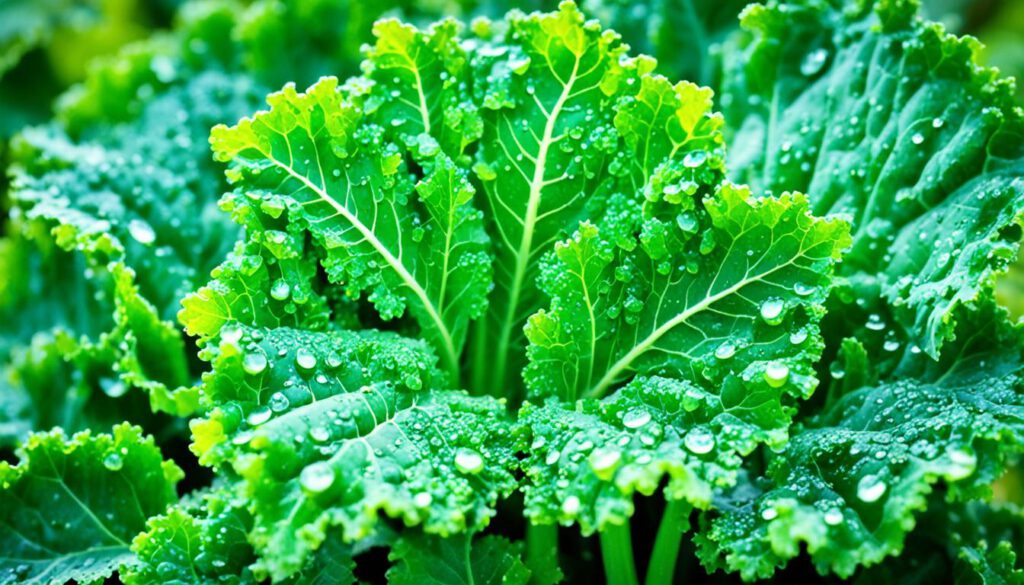Do you ever wake up feeling sluggish, struggling to find the energy to get through the day? Or perhaps you feel like your vitality is slipping away, leaving you feeling depleted and uninspired. I’ve been there too, and it’s a tough place to be. But I discovered a secret that changed everything for me – superfoods.
Superfoods are not just a trendy buzzword; they are nature’s gift to us, packed with potent nutrients that can fuel our bodies and revitalize our spirits. It’s incredible how a simple change in our diet can have such a profound impact on our energy levels and overall well-being. And believe me, the results are truly transformational.
Imagine waking up each morning feeling refreshed and ready to take on the day – that’s the power of superfoods. From improving stamina to enhancing vitality, these nutrient-dense wonders can supercharge your life in ways you never thought possible.
Join me on a journey as we explore the top 10 superfoods that can give you the natural energy and vitality you’ve been longing for. We’ll dive deep into their incredible health benefits and discover how they can support your overall well-being. Say goodbye to fatigue and hello to a life filled with boundless energy and renewed vitality.
Are you ready to unlock the secrets of superfoods and transform your life? Let’s get started!
Key Takeaways:
- Superfoods are packed with potent nutrients that can boost your energy and enhance your vitality.
- By incorporating superfoods into your diet, you can experience a profound transformation in your overall well-being.
- Join us as we explore the top 10 superfoods that can supercharge your life and leave you feeling energized and revitalized.
- Say goodbye to fatigue and hello to boundless energy by embracing the power of superfoods.
- Get ready to unlock the secrets of superfoods and embark on a journey to a life filled with vitality.
Understanding Superfoods and Their Benefits
Superfoods are nutrient-dense foods that offer a wide range of health benefits. They are packed with vitamins, minerals, antioxidants, and other bioactive compounds that can support overall health and well-being. Incorporating superfoods into your diet can promote holistic wellness and boost your energy and vitality.
What Makes a Food ‘Super’
Superfoods are characterized by their exceptional nutrient density. They contain high levels of essential vitamins, minerals, and antioxidants that are vital for maintaining good health. These foods go beyond basic nutrition, offering unique compounds and properties that support various bodily functions and contribute to overall well-being.
The Role of Superfoods in Strengthening Immunity
Superfoods play a crucial role in strengthening the immune system. They are rich in immune-boosting vitamins and minerals, such as vitamin C, vitamin A, zinc, and selenium. These nutrients help protect against infections, strengthen the body’s natural defense mechanisms, and support optimal immune function.
Combating Inflammation and Supporting Mental Health
Inflammation is a common underlying factor in many chronic diseases. Superfoods contain potent anti-inflammatory compounds, such as polyphenols and omega-3 fatty acids, which help reduce inflammation in the body. Moreover, these nutrient-rich foods can also support mental health by providing essential nutrients that promote brain function, improve mood, and enhance cognitive abilities.
Nourish Your Heart Health with Oats
Oats are a nutritional powerhouse, especially when it comes to heart health. Incorporating oats into your diet can provide a nourishing boost to your cardiovascular health and contribute to overall energy and vitality.
Oats are rich in fiber, which plays a crucial role in maintaining heart health. Dietary fiber can help lower cholesterol levels, reduce the risk of cardiovascular diseases, and promote a healthy heart.
Incorporating whole grains like oats into your daily meals is an excellent way to support your heart health. Whole grains are packed with essential nutrients, including vitamins, minerals, and fiber, that contribute to cardiovascular well-being.
Quinoa: The Complete Protein Source for Muscle Repair

Quinoa is a versatile and nutritious grain that offers a range of health benefits, especially when it comes to muscle repair. As a complete protein source, quinoa contains all nine essential amino acids that are necessary for the growth and repair of muscles in the body.
Rich in Amino Acids and Minerals
Quinoa is particularly rich in amino acids, which are the building blocks of proteins. These amino acids play a crucial role in repairing and rebuilding muscle tissues after physical activity or exercise. By consuming quinoa, you can provide your body with the necessary amino acids it needs for optimal muscle repair and growth.
In addition to amino acids, quinoa is also packed with important minerals that support overall health and well-being. Two key minerals found in quinoa are folate and magnesium.
Energy Levels and the Role of Folate and Magnesium
Folate, also known as Vitamin B9, is essential for energy production and the formation of red blood cells. It helps convert food into energy, ensuring that your body has the fuel it needs to function at its best. Quinoa is a great source of folate, making it an excellent addition to your diet for sustained energy levels.
Magnesium is another vital mineral found in quinoa, which plays a crucial role in maintaining healthy energy levels. It helps convert the food we eat into energy and supports proper muscle function. Including quinoa in your meals can help ensure that you have sufficient magnesium levels to support optimal energy production.
By incorporating quinoa into your diet, you can support muscle repair, boost energy levels, and enhance your overall vitality.
| Nutrient | Amount per 1 cup (185g) cooked quinoa |
|---|---|
| Protein | 8 grams |
| Amino Acids | Contains all 9 essential amino acids |
| Folate (Vitamin B9) | 19% of the Daily Value (DV) |
| Magnesium | 30% of the DV |
Blueberries: Antioxidant Powerhouse for Immune Support
When it comes to supporting your immune health, blueberries are an absolute powerhouse. Packed with antioxidants, vitamins, minerals, and phytochemicals, these tiny berries provide a natural boost to your immune system.
The antioxidants in blueberries help protect your body against oxidative stress, which can damage cells and weaken your immune function. By reducing oxidative stress and inflammation, blueberries support the overall health of your immune system.
In addition to antioxidants, blueberries are rich in vitamins and minerals that are essential for immune support. They contain vitamin C, which is known to enhance immune function and help fight off infections. Blueberries also provide a good source of vitamins A and E, which further contribute to a strong immune system.
Furthermore, blueberries are packed with phytochemicals, which are natural compounds that have been shown to have immune-boosting properties. These phytochemicals can stimulate the production of certain immune cells and enhance the body’s defense mechanisms.
By incorporating blueberries into your daily diet, you can give your immune system the support it needs to stay strong and healthy. Whether you enjoy them fresh, frozen, or in smoothies, blueberries are a delicious and nutritious way to enhance your energy and vitality.
Omega-3s in Salmon: A Vital Component for Cardiovascular Health
Salmon is a rich source of omega-3 fatty acids, specifically EPA and DHA, which are essential for cardiovascular health. These omega-3s can help reduce inflammation, lower blood pressure, and support optimal heart function. Incorporating salmon into your diet is a delicious way to improve your cardiovascular health and boost your overall energy and vitality.
Benefits of EPA and DHA in Salmon
EPA (eicosapentaenoic acid) and DHA (docosahexaenoic acid) are two types of omega-3 fatty acids found in salmon. These fatty acids have been extensively studied and have shown numerous benefits for cardiovascular health. Here are some key benefits of EPA and DHA:
- Reduced inflammation: EPA and DHA can help reduce inflammation in the body, which is a known risk factor for cardiovascular diseases.
- Lower blood pressure: Consuming EPA and DHA from salmon has been associated with lower blood pressure levels, contributing to heart health.
- Support optimal heart function: Omega-3s play a vital role in maintaining healthy heart function, including regulating heart rhythm and preventing blood clot formation.
By including salmon in your meals regularly, you can enjoy these benefits and support your cardiovascular health.
Fatty Fish Recommendations from the American Heart Association
The American Heart Association (AHA) recommends consuming fatty fish, such as salmon, at least two times per week to promote heart-healthy benefits. Fatty fish are an excellent source of omega-3s and provide a wide range of nutrients that support cardiovascular health. Incorporating these fish into your diet can be a delicious and nutritious way to improve your heart health.

| Omega-3 Fatty Acid | Amount per 100g of Salmon |
|---|---|
| EPA (eicosapentaenoic acid) | 0.22-1.17 grams |
| DHA (docosahexaenoic acid) | 0.62-1.53 grams |
Table: Amount of EPA and DHA in 100g of Salmon
As shown in the table, salmon is an excellent source of EPA and DHA, providing significant amounts of these essential omega-3 fatty acids.
By including omega-3-rich salmon in your diet, you can improve your cardiovascular health and enjoy the heart-healthy benefits of these essential fatty acids.
Avocados: Healthy Fats and Nutrient Density for Metabolism
Avocados are a versatile and nutritious fruit that offer numerous health benefits. They are well-known for their rich content of healthy fats and nutrient density, making them an excellent choice for supporting metabolism and energy production.
The monounsaturated fats found in avocados are not only delicious but also beneficial for regulating blood sugar levels and promoting satiety. These healthy fats can contribute to sustainable energy levels throughout the day, helping to avoid energy crashes and promote overall well-being.
Avocados are also packed with essential nutrients, including vitamins (such as vitamin K, vitamin C, and vitamin E), minerals (such as potassium and magnesium), and dietary fiber. These nutrients play crucial roles in various bodily functions, including energy production, metabolism regulation, and weight management.
By including avocados in your diet, you can nourish your body with these essential nutrients, supporting optimal metabolism and energy levels. Avocados can be enjoyed in various ways, whether mashed on toast, added to salads, or incorporated into smoothies. Their creamy texture and mild flavor make them a versatile addition to any meal or snack.
In summary, avocados are a powerhouse when it comes to healthy fats and nutrient density. Incorporating avocados into your diet can support metabolism, energy production, and weight management. So why not try adding some delicious avocados to your meals and enjoy the nourishing benefits they provide?
Unlocking Energy with Iron-Rich Leafy Greens like Kale
Leafy greens like kale are a powerhouse of nutrients that can help unlock your energy potential. One of the key nutrients found in kale is iron, which plays a vital role in energy production within the body. Iron is essential for transporting oxygen throughout the body, and maintaining healthy energy levels.
Kale’s Nutrient Profile and Energy Benefits

“Kale is packed with essential vitamins, minerals, and antioxidants that can support overall health and provide sustained energy benefits.”
Kale’s nutrient profile is impressive, making it one of the top leafy greens for energy and vitality. It is rich in vitamins A, C, and K, which contribute to a healthy immune system and support cellular energy production. Kale also contains a good amount of folate, a B-vitamin that aids in red blood cell formation and proper energy metabolism. Additionally, it is a great source of fiber, which helps stabilize blood sugar levels and provides a sustained release of energy throughout the day.
Incorporating Greens for Maximum Health Advantage
To reap the maximum health advantages and energy benefits of leafy greens like kale, it is important to incorporate them into your daily diet. Here are some simple and delicious ways to add kale to your meals:
- Blend kale into smoothies or juices for a refreshing and nutrient-packed drink.
- Sauté kale with garlic and olive oil as a flavorful side dish.
- Add chopped kale to soups, stews, or stir-fries for an extra nutritional boost.
- Use kale as a base for salads and top it with your favorite protein and vegetables.
- Create kale chips by baking kale leaves with a sprinkle of salt and olive oil.
By incorporating leafy greens like kale into your diet, you can harness the energy benefits of iron and enjoy the overall health advantage they offer. So, don’t forget to add a generous serving of kale to your plate and fuel your body with the nutrients it needs for sustained energy and vitality.
Superfoods, Energy, Vitality: Catalysts for a Dynamic Life
Superfoods play a crucial role in providing energy and vitality, making them catalysts for a dynamic and fulfilling life. By incorporating superfoods into your diet, you can nourish your body with essential nutrients, support overall health and well-being, and boost your energy levels. Superfoods are a key component of a holistic approach to wellness and can contribute to optimal physical and mental performance.
Superfoods are nutrient-dense foods that offer a wide range of health benefits. They are packed with vitamins, minerals, antioxidants, and other bioactive compounds that can support overall health and well-being. These foods have been shown to strengthen the immune system, combat inflammation, and support mental health. By including superfoods in your diet, you can promote holistic wellness and boost your energy and vitality.
Conclusion
In conclusion, incorporating superfoods into your diet can have significant benefits for energy and vitality. By integrating these nutrient-dense foods into your lifestyle, you can support overall health, enhance energy levels, and experience long-term benefits.
Integrating Superfoods into Your Lifestyle
Integrating superfoods into your lifestyle is a simple and effective way to boost your energy and enhance your vitality. Start by incorporating a variety of superfoods into your meals, such as oats, quinoa, blueberries, and salmon.
Experiment with recipes that incorporate these superfoods, such as overnight oats with blueberries, quinoa salads with fresh vegetables, and baked salmon with leafy greens.
Remember to prioritize consistency and sustainability in your dietary habits. Make superfoods a consistent part of your diet by planning your meals in advance, meal prepping, and exploring creative ways to incorporate these nutrient-rich foods into your daily routine. This will ensure that you can experience their full benefits and maintain your energy and vitality in the long term.
Long-Term Benefits of a Nutrient-Rich Diet
The benefits of a nutrient-rich diet that includes superfoods extend far beyond immediate energy and vitality. By nourishing your body with essential vitamins, minerals, and antioxidants, you can support your immune system, improve digestion, and protect against chronic diseases over time.
A nutrient-rich diet can also have positive long-term effects on your mental health, helping to support cognitive function and reducing the risk of mental health disorders. By adopting sustainable dietary habits and prioritizing the consumption of superfoods, you can proactively invest in your long-term well-being and enjoy a vibrant and energetic life.
So, make the choice to incorporate superfoods into your lifestyle today, and reap the benefits of sustained energy, enhanced vitality, and optimal health in the years to come.
